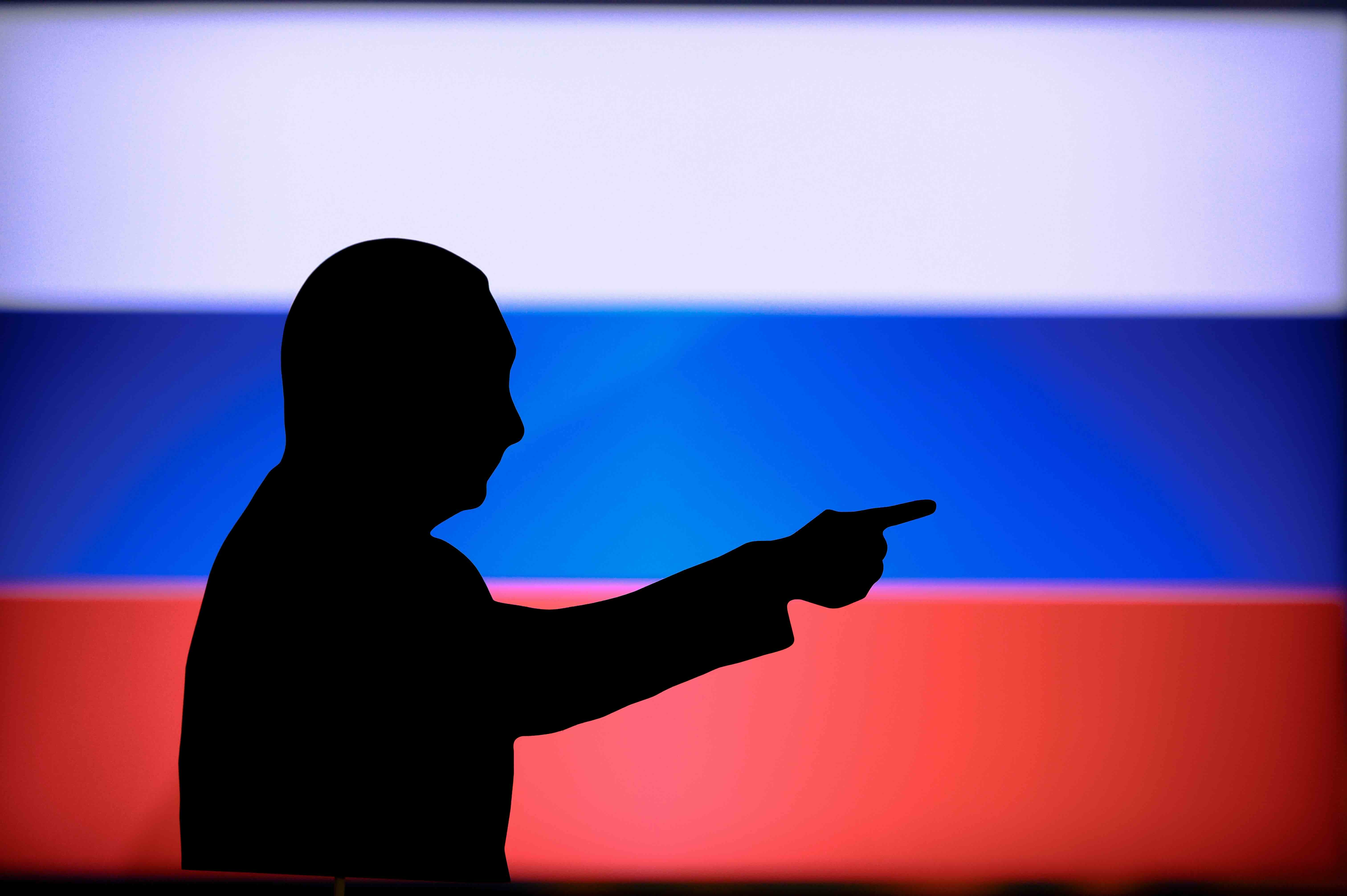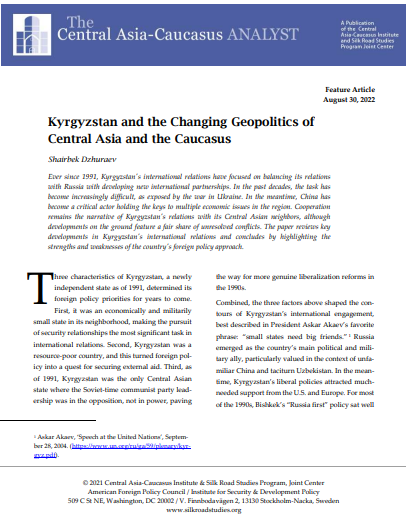History Repeating Itself: Is Russia Trying to Ruin Central Asian Integration Efforts?
By Farkhod Tolipov
In mid-December 2025, several Russian state-controlled media outlets spread a rumor that Russia could apply for membership in the Central Asian Community. This statement followed Azerbaijan’s entry into the regional grouping in November at the 7th Consultative Meeting of the Heads of State of Central Asia, held in Tashkent. The rumor reminded of Russia’s accession to the Central Asian Cooperation Organization in 2004, which led to the merger of that body with the Russia-led Eurasian Economic Community. Once again, Russia seeks to join the Central Asian Community, potentially worsening geopolitical tensions in the region.

BACKGROUND: Twenty years ago, in 2004, Russia applied for membership in the Central Asian Cooperation Organization (CACO). At that time, the presidents of two key states, Kazakhstan’s Nursultan Nazarbayev of and Uzbekistan’s Islam Karimov, were unable to refuse Moscow. This external membership in CACO eventually led to the organization’s collapse. One year after Russia’s admission, CACO was merged with the Russia-led Eurasian Economic Community (EvrAzES) on the grounds that the two organizations duplicated each other. Uzbekistan withdrew from EvrAzES in 2008. The structure itself existed until 2014, and in 2015, it was replaced by the Eurasian Economic Union (EAEU). Only two Central Asian states, Kazakhstan and Kyrgyzstan, are now members of the EAEU.
In 2019, the Russian side suddenly announced that Uzbekistan could become a member of the EAEU. Uzbekistan never confirmed either its desire or the possibility of such membership but decided in December 2020 to become an observer in the EAEU. Since then, Moscow has constantly and officially reminded Uzbekistan that the EAEU is waiting. Recently, the President of Belarus Aleksandr Lukashenko even stated that “we are looking forward to Uzbekistan’s membership in the EAEU.” Notably, such statements come only from Russia or Belarus; other EAEU states are not focused on this, and Uzbekistan does not show a strong interest in joining the organization.
Against this backdrop, two geopolitical issues cause concern in Moscow. First, without Uzbekistan in the EAEU, Central Asia cannot be brought under full Russian control. Second, the EAEU remains a very small entity, consisting of only five former Soviet republics. This limited composition does not support Russia’s image as a great power but, on the contrary, highlights its difficulty in asserting such a status.
It has become a tradition that the informal summits of the EAEU and the CIS are held in Saint Petersburg on the same days. On 22–23 December 2025, both events took place in the city. Reports on the CIS/EAEU summits were quite modest and contained no serious statements, except positive remarks about increased trade within the CIS/EAEU during the year. These largely symbolic events took place against the background of the war in Ukraine, which has dealt a serious blow to Moscow’s international reputation. In this context, Russia is using different means to preserve its influence in Central Asia while losing control over other parts of the former Soviet space.
IMPLICATIONS: Azerbaijan’s president Ilham Aliyev did not attend the EAEU summit, citing his country’s non-membership in the organization. He also did not travel to Saint Petersburg for the CIS summit, referring to his busy schedule. However, in November Azerbaijan became a full participant in the Consultative Meetings of the Heads of State of Central Asia (CMHS).
Although Baku’s accession to the CMHS is assessed differently across the region, this expansion of the “C5” format into a “C6” is likely viewed in Moscow as a new challenge to Russia’s position in the region of the “stans.” This may explain the appearance of rumors that Russia could apply for membership in the CMHS. At the same time, the increasingly pro-Russian policies of all Central Asian states, whether genuine or aimed at avoiding Moscow’s displeasure, raise concerns that history may repeat itself and that the Central Asian Community could again open its doors to Russia.
Uzbekistan’s President Shavkat Mirziyoyev delivered a speech at the meeting of the Supreme Eurasian Economic Council that resembled a statement from a full member. He described EAEU countries as “our strategic and natural partners.” According to the president, Uzbekistan actively participates in all key Eurasian formats. He also stated that “we believe it is necessary to strengthen coordination between the institutions of the CIS and the EAEU.”
Mirziyoyev highlighted several issues, including the elimination of trade barriers and the creation of an Uzbekistan–EAEU coordination group on tariff and non-tariff barriers; the development of industrial cooperation and the launch of joint projects in machinery, energy, agriculture, and the chemical sector; the digitalization of trade and customs administration; participation in EAEU technological platforms, from biomedicine and new materials to robotics; and the creation of a unified tourism space that would combine products of the Union’s member states.
Overall, the narrow, trade- and business-centered rhetoric surrounding the EAEU does not indicate the emergence of a shared regional identity among its member states, which is both a key condition for and an outcome of meaningful integration. In contrast, a broader vision of Central Asia, based on a natural sense of common identity among its peoples, is far stronger than a solely economic grouping of states. Indeed, the November summit of Central Asian leaders in Tashkent produced notable signs of deeper regional integration. In particular, it was announced that the CMHS format could be transformed into a Community of Central Asia (CCA).
Despite this major trend in Central Asia, the pro-Russian, or seemingly pro-Russian, policies of regional leaders may have a reverse effect and lead to a repetition of history, including a renewed Russian application for membership in the CCA for purely geopolitical reasons. In a recent and telling statement, Russia’s ambassador to Uzbekistan claimed that “Uzbekistan assured the Russian Federation that the era of the Great Game has passed into oblivion.” The remark suggests the opposite: the Great Game may be entering a new phase in which it is not Uzbekistan or other Central Asian states that shape geopolitical rivalry, but Russia itself, which continues to view the region through the lens of great-power competition. Throughout its independence, Uzbekistan has sought to avoid geopolitical entanglements. Therefore, if assurances about the end of geopolitical games are needed, they should come from great powers themselves, rather than from Central Asian states.
Moscow may believe that Russia’s membership in CAC would signal the end of the Great Game, whereas in reality it would represent yet another expression of Russia’s enduring geopolitical modus vivendi.
CONCLUSIONS: Central Asia is entering a new round of the geopolitical Great Game, and this game is being driven primarily by Russia. In the context of the war in Ukraine, this outcome is hardly surprising. Moscow’s foreign policy and its broader international behavior are clearly dominated by geopolitical considerations.
At present, one can observe the emergence of two opposing geopolitical configurations, the “Eurasian Five” of the Eurasian community versus the “Central Asian Six” of the Central Asian Community. The paradox of this dual trend, however, is that two Central Asian states, Kazakhstan and Kyrgyzstan, are members of both EAEU and CAC.
In 2004, Russia’s accession to CACO distorted, weakened, and ultimately destroyed the organization and the broader process of integration among the five Central Asian states. As a result, regional integration was halted for a decade and revived only in 2017. Integration in Central Asia is a distinct phenomenon: from the outset, it has been shaped in part to avoid geopolitical entanglements. By its nature, Central Asian integration cannot include any major power, regardless of which one it is, because such inclusion would inevitably introduce a dimension of geopolitical competition into the integration process.
AUTHOR’S BIO: Dr. Farkhod Tolipov holds a PhD in Political Science and is Director of the Education and Research Institution “Bilim Karvoni” (“Knowledge Caravan”) in Tashkent, Uzbekistan.
Kyrgyzstan and the Changing Geopolitics of Central Asia and the Caucasus
By Shairbek Dzhuraev
August 30, 2022
Ever since 1991, Kyrgyzstan's international relations have focused on balancing its relation with Russia with developing new international partnerships. In the past decades, the task has become increasingly difficult, as exposed by the war in Ukraine. In the meantime, China has become a critical actor holding the keys to multiple economic issues in the region. Cooperation remains the narrative of Kyrgyzstan's relations with its Central Asian neighbors, although developments on the ground feature a fair share of unresolved conflicts. The paper reviews key developments in Kyrgyzstan's international relations and concludes by highlighting the strengths and weaknesses of the country's foreign policy approach.
Georgia’s prime minister visits Armenia
By Erik Davtyan
October 3rd, the CACI Analyst
On September 5, Georgia’s Prime Minister Giorgi Kvirikashvili, along with Vice Prime Minister and Minister of Energy Kakha Kaladze, and Deputy Minister of Foreign Affairs David Dondua, paid a one-day visit to Yerevan. Kvirikashvili has previously visited Armenia as Minister of Economy and Sustainable Development, however this was his first official visit after he became Prime Minister in December 2015. The visit came nearly a month before parliamentary elections in Georgia, which are set for October 8. Less than one week before, Kvirikashvili made a similar visit to Azerbaijan. During both visits, the Georgian delegation was composed of exactly the same level of representatives, although another deputy foreign minister was present in Azerbaijan – indicating the importance that Georgian authorities attach to demonstrating a balanced policy towards its two neighbor states.
The Nagorno-Karabakh conflict at the center of Russia-Armenia relations
By Erik Davtyan
May 13th, the CACI Analyst
The unprecedented escalation of the Nagorno-Karabakh conflict on April 2-5 is the topic of a process of intense discussions between Russian and Armenian authorities. After the Chiefs of Staff of Armenia’s and Azerbaijan’s armed forces, Yuri Khachaturov and Najmaddin Sadigov, reached an oral ceasefire agreement in Moscow, Russia immediately activated its policy toward the conflict, including several high-level visits to Yerevan and Baku for discussions with the respective authorities.
Economic models of Eurasianism and the Eurasian Union: why the future is not optimistic
By Vladimer Papava
October 29, 2015, The CACI Analyst
A new Russia-Kazakhstan regional project, named the Eurasian Economic Union (EAEU), was launched in 2015. Specifically, as of January 1, 2015, integrated economic processes among Belarus, Kazakhstan and Russia are governed by the EAEU Treaty. As of January 2, Armenia joined the EAEU and as of May 21, Kyrgyzstan also became a member. In 2011, after the President of Russia declared the establishment of the Eurasian Union, some politicians and experts perceived it as a final victory of Eurasianism ideology in Russia. Under such circumstances, there is a need to analyze the economic models of Eurasianism and the Eurasian Union for a better understanding of their future.






